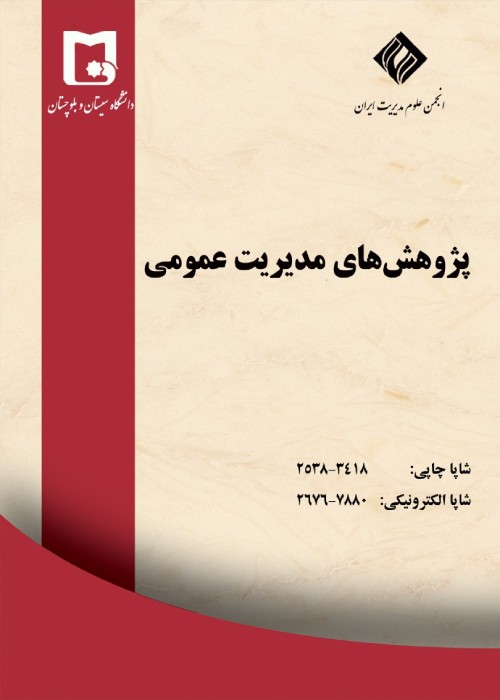Identification and Explanation of Antecedents and Consequences of Psychological Ownership in Public Organizations Bushehr Province
Psychological ownership is one of the main issues taken into account by management theorists and experts in recent years in an effort to motivate employees. In this regard, the research objectives included the identification and prioritization of antecedents and consequences of psychological ownership in public organizations. The present study is developmental in terms of objective and analytical exploratory survey in terms of methodology. In the first stage of study which was qualitative, systematic review method has been used for identification of antecedent and consequences components. For data collection and evaluation of model variables, questionnaire has been used, the validity and reliability of which had been previously confirmed. The statistical population of study included the employees working in public organizations under supervision of 16 ministries in Bushehr city, out of which 333 subjects were selected as sample through stratified random method. For analysis of collected data, structural equation modeling through AMOS software has been used. The findings showed that using precedents of this study can lead to promotion of the psychological ownership and as a consequent, the achievement of the intended consequences in the studied organizations are expected..
Public services organizations represent government in practice; therefore, the government seeks to promote these organizations more than before. Recently, psychological approach toward increasing organizations' performance has been taken into account; based on which the promotion of psychological aspects in organization could elevate the organizational performance more than other factors. One of the organizational variables considered in recent years is psychological ownership. The investigations indicate that there are various factors (organizational, individual and contextual) that provide the ground for formation of psychological ownership. Moreover, through creating internal motivation, the psychological ownership highly affect the organizational variables such as organizational commitment, responsibility, job satisfaction, organizational citizenship behavior, organizational competitiveness and etc. The searching of databases shows that there is no reliable integrated model for realization and prioritization of antecedents and consequences of psychological ownership in public sector. This study seeks to identify and prioritize the constituting factors and the consequences of this variable in public organizations. Case Study For identification of antecedents and consequences of psychological ownership, the statistical population of study included texts related to subject matter in local and foreign books and journals. In addition, for their prioritization, the management experts with orientations of organizational behavior, public management and human resources of 8 superior universities of the country and Persian Gulf University of Bushehr (as a result of local context) and the managers of organizations and deputies of human resources of public services organizations of 16 ministries in Bushehr city have been taken into account. From this population, 30 experts and 32 managers and deputies have been selected as the sample of the study. In second stage, for testing final model, the statistical population included the employees working in abovementioned organizations. Using Cochran formula, the minimum volume of sample had been specified as 333 subjects.
The present study is developmental in terms of objective and it has been carried out based on positivism paradigm and consequently comparative approach. To determine the validity of questionnaire, content and construct validity have been used. The reliability of the study has been examined through Cronbach Alpha. The collected data have been analyzed through Structural Equation Modeling via AMOS.
The results of Friedman test showed that four factors of person-job fit, participation in decision-making, transformational leadership and perceived control are the main influential factors and organizational commitment, job motivation, organizational citizenship behavior and job satisfaction are the main consequences of psychological ownership. For testing hypothesis, partial index (p-value) and significant number have been used. Concerning p-value and significant number of hypotheses which are respectively less than 0.05 and more than 1.96; it can be concluded that all research hypotheses are confirmed at reliability level of 95%. Therefore, the relationship between antecedents and consequences and psychological ownership is meaningful and the mediating role of psychological ownership in antecedents and consequences relation is confirmed.
The confirmation of relationship between person-job fit and psychological ownership indicates that person-job fit highlights the mediating role of this variable (psychological ownership) in addition to forming psychological ownership. This finding shows the significance of designing jobs and careers in organizations. Consideration of this issue not only enhances the feeling of ownership, it also has a good predictability role in enhancing occupational attitudes including organizational commitment, job satisfaction, organizational citizenship behavior and job motivation of employees. This is also true in relation with participation in decision making, perceived control and transformational leadership. Through participating in decision making, individuals feel that they have freedom of action in determining the fate of organization which is indicative of the feeling of ownership. More importantly, participation in decision making has been effective in prediction of individual consequences as previously mentioned (commitment, satisfaction, citizenship behavior and motivation). Out of 4 effective factors on attitudinal and behavioral consequences through psychological ownership, participation in decision making has higher predictability power in comparison with other three predictors. As far as transformational leadership mostly reminds human identity in comparison with transactional leadership, it has been effective in shaping psychological ownership as well as enhancing the consequences mostly related to individual level the same as two former antecedents. Finally, the perceived control which embeds to some extent assurance and predictability indicates that providing the ground for delegation of responsibility to employees not only enhances the empowerment, it also could be effective in shaping effective psychological ownership and have good predictability role in enhancing the occupational attitudes (organizational commitment, job satisfaction and citizenship behavior and job motivation of employees. This factor is in the second rank in terms of importance from among four effective factors on attitudinal and behavioral consequences.
- حق عضویت دریافتی صرف حمایت از نشریات عضو و نگهداری، تکمیل و توسعه مگیران میشود.
- پرداخت حق اشتراک و دانلود مقالات اجازه بازنشر آن در سایر رسانههای چاپی و دیجیتال را به کاربر نمیدهد.



